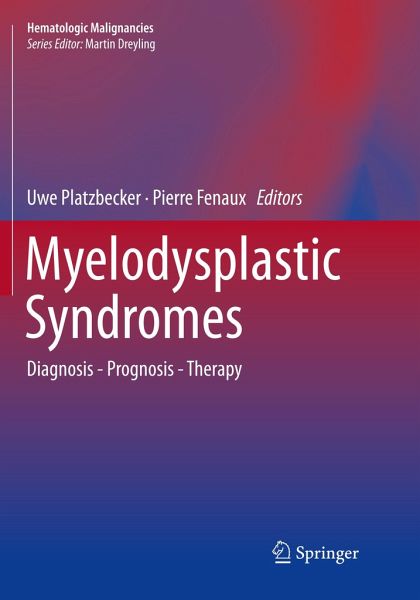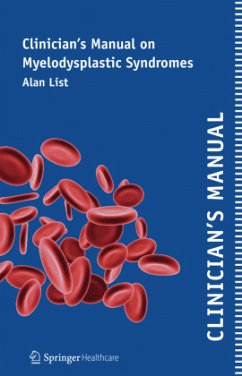
Myelodysplastic Syndromes
Diagnosis - Prognosis - Therapy
Herausgegeben: Platzbecker, Uwe; Fenaux, Pierre
Versandkostenfrei!
Versandfertig in 6-10 Tagen
68,99 €
inkl. MwSt.

PAYBACK Punkte
34 °P sammeln!
This book reviews the standard diagnostic and therapeutic management of patients with myelodysplastic syndromes (MDS) and examines ongoing research developments in the field. The importance of appropriate prognostic stratification, taking into account recent advances in understanding of the molecular pathogenesis of MDS, is explained, and both established and novel treatment approaches are discussed in depth. The coverage includes, for example, the use of erythropoietic stimulating agents, iron chelation therapy, the immunomodulator lenalidomide, hypomethylating agents such as azacitidine, and...
This book reviews the standard diagnostic and therapeutic management of patients with myelodysplastic syndromes (MDS) and examines ongoing research developments in the field. The importance of appropriate prognostic stratification, taking into account recent advances in understanding of the molecular pathogenesis of MDS, is explained, and both established and novel treatment approaches are discussed in depth. The coverage includes, for example, the use of erythropoietic stimulating agents, iron chelation therapy, the immunomodulator lenalidomide, hypomethylating agents such as azacitidine, and allogeneic hematopoietic stem cell transplantation.
Myelodysplastic syndromes are heterogeneous and complex hematologic disorders ranging from indolent conditions to forms approaching the aggressiveness of acute myeloid leukemia. The diversity of MDS gives rise to challenges in diagnosis and clinical decision making, and the highly variable clinical course necessitates a risk-adapted treatment strategy and the application of disease-specific therapies. Hematologists, oncologists, and other interested clinicians will find this book to be an invaluable source of information on diagnostic and prognostic evaluation and treatment selection.
Myelodysplastic syndromes are heterogeneous and complex hematologic disorders ranging from indolent conditions to forms approaching the aggressiveness of acute myeloid leukemia. The diversity of MDS gives rise to challenges in diagnosis and clinical decision making, and the highly variable clinical course necessitates a risk-adapted treatment strategy and the application of disease-specific therapies. Hematologists, oncologists, and other interested clinicians will find this book to be an invaluable source of information on diagnostic and prognostic evaluation and treatment selection.












